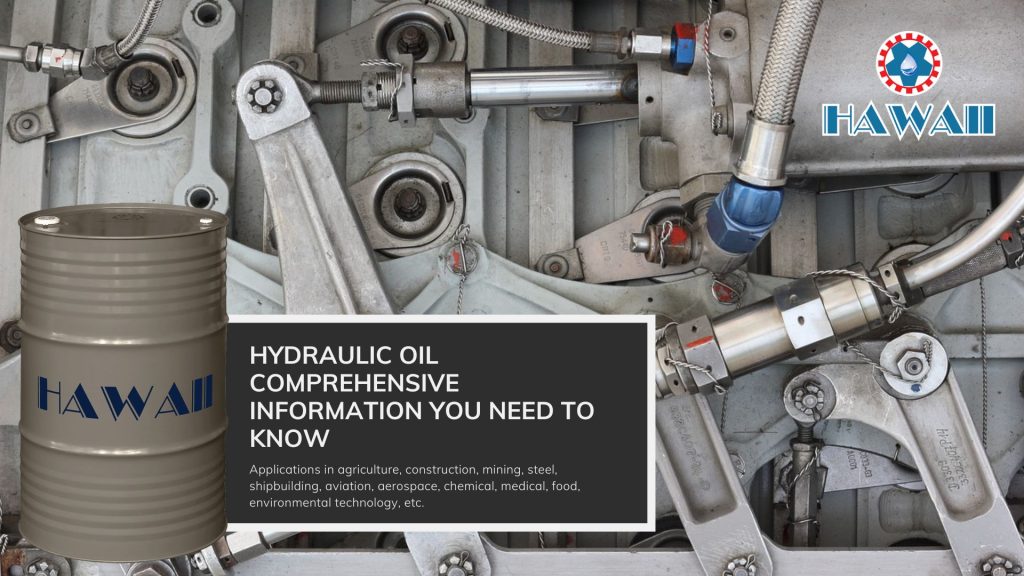
Hydraulic Oil | Comprehensive Information You Need to Know
Hydraulic – an indispensable technology in many machinery systems today, where energy and power are transmitted through fluid. The fluid used is called hydraulic fluid or hydraulic oil and is used in various types of machinery, equipment, and in many industries.
Moreover, hydraulic systems and components are applied in agriculture, construction, mining, steel, shipbuilding, aviation, aerospace, chemical, medical, food, environmental technology, etc. You can name any industry in the world, and you can see the significant relevance to these hydraulic systems.
MINERAL BASED HYDRAULIC OIL
Mineral-based hydraulic oil originates from fractions of crude oil. Furthermore, they are refined to a level where they achieve suitable lubricating properties. They are then enhanced with a system of additives. These additives serve various functions and may have anti-wear, anti-corrosion, and oxidation-inhibiting properties, as well as improve viscosity index and other characteristics.
As they are derived from crude oil, they represent a lower-cost option compared to their synthetic counterparts. Depending on the quality of the base oil and the additive package, these mineral-based lubricating hydraulic oils can deliver high performance, such as the conventional Fusito™ HVLP and HLP hydraulic oils.
The additives in mineral-based hydraulic oil protect hydraulic systems against corrosion, wear, and water contamination. Additionally, they improve the oil’s demulsibility and viscosity index, enhancing its resistance to temperature changes. This category also includes hydraulic oils with detergents/dispersants.

SYNTHETIC BASED HYDRAULIC OIL
Synthetic-based hydraulic oils are designed to compensate for the shortcomings of mineral-based hydraulic oils. They are made from chemically produced base oils, offering superior features compared to mineral-based hydraulic oils. Moreover, they have demonstrated high performance at high temperatures, excellent oxidation stability, and biodegradability. However, being synthetic fluids, they come at a much higher cost, may have higher toxicity, and may not be compatible with certain sealing materials.
FIRE-RESISTANT HYDRAULIC FLUIDS
Both mineral-based and synthetic-based oils are used to formulate fire-resistant hydraulic fluids with rapid biodegradability. As the name suggests, these hydraulic oils are designed for applications with a high risk of fire, including aviation, mining, steel plants, and die-casting applications. Due to this crucial feature, they are used in a variety of applications and are less expensive than synthetic hydraulic oils.
However, concerning anti-wear protection, they lag behind synthetic fluids. On the other hand, the additives used in fire-resistant hydraulic fluids help improve corrosion resistance, reduce friction, and create foam. Fire-resistant hydraulic fluids can be water-in-mineral oil emulsions, water-in-synthetic oil emulsions, water-in-oil emulsions with mineral oil, water-in-oil emulsions with synthetic oil, and water-free fluids.
>> Explore more: CHANGING ENGINE OIL TO INCREASE POWER, FACT OR MYTH?
RAPID BIODEGRADABLE HYDRAULIC OILS
This type of hydraulic oil is developed to meet increasingly stringent environmental protection standards. Additionally, they provide ecological compatibility and can be used for both stationary and mobile applications in industries such as agriculture, forestry, mining, tunnel construction, and land-based equipment.
- Vegetable-based oils (rapeseed oil and sunflower oil) are not soluble in water.
- Hydraulic oils insoluble in water.
- Hydraulic oils soluble in water.
- Hydrocarbon products.
- Due to their characteristics, biodegradable hydraulic oils are also used for marine applications and hydraulic systems of ships.
FOOD-GRADE HYDRAULIC OILS
This category is based on various international guidelines that regulate which base oils and additives can be used in the formulation of these hydraulic fluids. Food-grade hydraulic oils have subgroups indicating whether the lubricant is suitable for use in the food industry, where direct contact with food may occur, and subgroups for situations where such contact may occur. The base oils used for these hydraulic lubricants are specially white oils, special polyalphaolefins, and special polyglycols.
